Amidst the general dissatisfaction with last night’s Game of Thrones episode (“The Bells“), an assessment by Giant Bomb associate producer and Brooklyn-based comedian Abby Russell stands out. HE commentariat remarks are hereby requested.
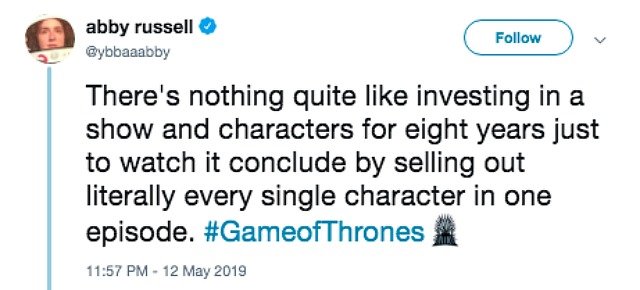
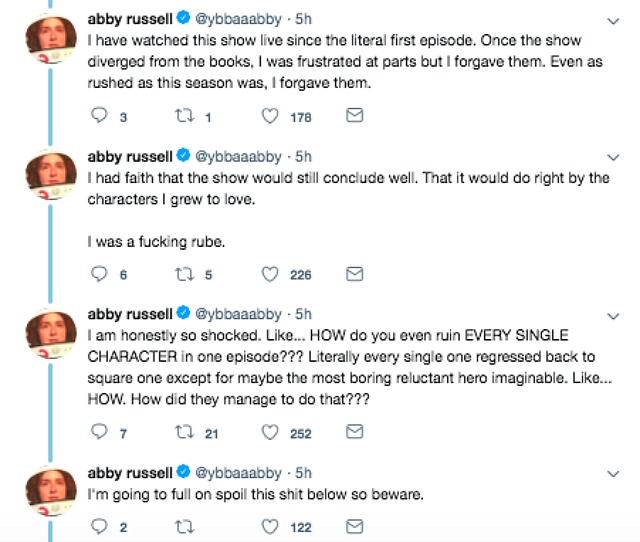
Amidst the general dissatisfaction with last night’s Game of Thrones episode (“The Bells“), an assessment by Giant Bomb associate producer and Brooklyn-based comedian Abby Russell stands out. HE commentariat remarks are hereby requested.


9:55 pm: Early this evening I bought a $15 ticket at the Hollywood Arclight in order to see the new trailer for Martin Scorsese‘s Silence, which I’d read wouldn’t be online until Saturday. I sat down just before the 8:15 pm show, pulled out my phone and read that Paramount had decided to release the trailer online tonight. Yes, I was surprised and a little pissed, but I’m not sorry I saw the trailer on a big Arclight screen. The film looks wonderful, fascinating, exotic…full of feeling. Ciarin Hinds! I can’t wait to see the whole magila. 5:50 pm: Hollywood Elsewhere will pay to see one of tonight’s pre-holiday showings of Allied so I can see the Silence trailer, which won’t appear online for another three and half days.
Never rat another guy out when it comes to women. To put it more formally, one of the most paramount ethical codes between adult males is that you can never spill the beans on a friend or acquaintance if his girlfriend or wife asks you to reveal the truth about whatever (i.e., usually his deep-down feelings or some past behavior that has come under question).
Determining the factual or emotional truth of things is something that only a couple can sort out for themselves. It’s not yours to get involved. If a guy is lying to his girlfriend or wife about some indiscretion or affair or saying anything out of earshot that might get him in trouble, it’s none of your damn business and you’re obliged to say nothing. Omerta. The truth will out sooner or later, but even if it doesn’t guys are absolutely honor-bound to protect each other. I’ve never run into a single fellow in my life who would even think of questioning this.
Except for one. He was a cartoonist-illustrator, and his betrayal happened in Manhattan in ’80 or thereabouts. I’ll call him Bob. We’d met each other in ’79 by way of a fetching lady writer we both felt for and admired (I was the new boyfriend and he was an ex), and then we got to be actual friends.
At some point in the middle of ’80 (i.e., after I’d been dumped by the writer) I began a mild flirtation with an iconoclastic female cartoonist whom Bob also knew. Let’s call her Shary. She was a respected, highly gifted artist and pretty besides. By coincidence she and I realized one day that we had booked seats on the exact same flight to Los Angeles. A day or two later I mentioned to Bob that I’d love to indulge in a mile-high club thing with Shary. It was just a fantasy, a wisp of a notion that came to mind and that I gave voice to.

A little more than two years ago I noted that David Jones‘ Betrayal (’83), a note-perfect adaptation of Harold Pinter’s 1978 stage play, was still not available via Bluray, DVD or streaming. At the time (5.30.15) the only way you could see it start to finish was to watch a murky version on YouTube. But on 6.4.17 a Russian woman named Alexandra Alexandrova uploaded a visually tolerable version (1.37 aspect ratio, probably taken from a musty CBS Fox Video VHS) to YouTube. Who knows how long it’ll last before the lawyers pounce so if you’ve never seen a passable copy, now’s your chance. Why the rights holders have refused for 30-plus years to license this brilliant infidelity drama to distributors is beyond me.
A Film Society of Lincoln Center screening of David Jones‘ long-absent Betrayal (’83) is happening tonight at the Walter Reade theatre. My flight to Los Angeles leaves around 4:30 pm otherwise I’d be there with bells on. I’ve been writing for years about the fact that this superb adaptation of Harold Pinter‘s celebrated stage play can’t be bought, borrowed or rented. I’ve written FSLC staffers for information. Here’s what I said:
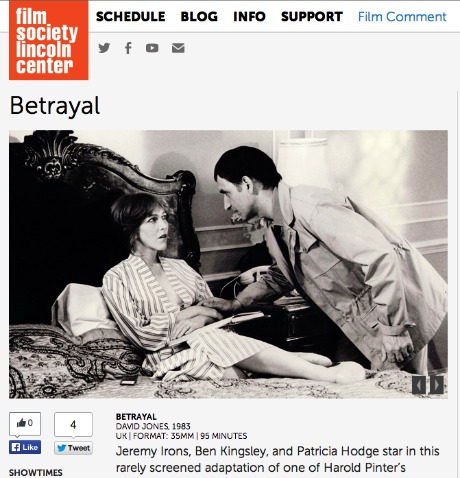
The Financial Times once defined Pinteresque dialogue as ”full of dark hints and pregnant suggestions, with the audience left uncertain as to what to conclude.” That’s not bad, but I’ve always defined it with seven words: (a) spare, (b) precise, (c) cutting and (d) sometimes a bit cruel. That leaves out opaque, terse, witty, chilly and all the other applicable terms, but however you slice it the man who created this form of expression — playwright Harold Pinter — died yesterday in London at age 78.
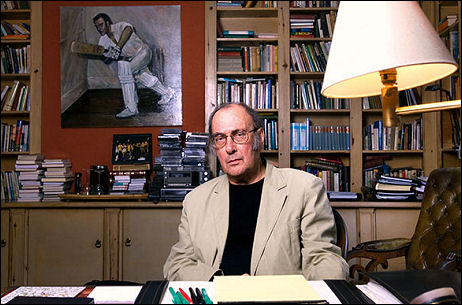
I’ve seen The Birthday Party and The Homecoming on-stage once each, and some of the films Pinter wrote screenplays for — The Servant (’63), The Go-Between (’70), The French Lieutenant’s Woman (’81), The Trial (’93) and Sleuth (’07). But being a bit of a Pinter plebe, my favorite is Betrayal, which has been called his most accessible work.
I’m queer for Betrayal because of its reverse chronology, the fascinating game it plays (i.e., what does he/she know, and when does he/she know it?), for the constant expert lying that goes on between the three main characters, and because it happens in a carefully mannered, flush and somewhat shallow middle-class milieu (which provides a form of comfort to me because I’ve lived in this world and feel I know what it is), and because it fulfills my definition of Pinter’s signature style — crisp, knowing and acrid in a less-is-more vein.
“I’ve always liked Jerry,” the cuckolded Robert says to his unfaithful wife about her longtime lover who’s also been his longtime friend. “To be honest, I’ve always liked him rather more than I’ve liked you. I should have had an affair with him myself.”
I saw Betrayal on the New York stage twice (with Roy Scheider, Raul Julia and Blythe Danner in ’80 or thereabouts, and again in a 2000 revival with Juliette Binoche, Liev Schreiber and John Slattery ), as well as that superb 1983 film adaptation with Ben Kingsley, Jeremy Irons and Patricia Hodge, directed by David Jones .
Originally released by 20th Century Fox, Jones’ Betrayal came out on VHS in ’84 but that was 24 years ago, for heaven’s sake. I’ve written this seventeen or eighteen times over the last ten years, but will be rights-holder please, please cut a deal with someone to put it out on DVD or Blu-ray? It’s been out of circulation for so long it looks like up to me.

Harold Pinter was named today in Stockholm as this year’s winner of the Nobel Prize in literature. The Birthday Party, The Servant, Accident…the screenplays for Turtle Diary, The French Lieutenant’s Woman…of course. But for me the ultimate Pinter work has always been Betrayal, which I first saw on the New York stage in 1980 with Roy Scheider, Raul Julia and Blythe Danner. Maybe the rights holder to David Jones’ riveting 1983 film version (CBS Fox Home Video put out a cruddy, muddy-looking VHS in the mid ’80s) will take notice and finally release a cleanly mastered DVD of this disappeared Pinter film, which costars Ben Kingsley, Jeremy Irons and Patricia Hodges. Where would the art of dialogue be without Pinter’s influence? Verbal evasion, unspoken menace, less is more, the things that are there but unsaid.
For decades I tried to catch the most highly-regarded Manhattan plays, and I’m very grateful that I made the effort. We all realize that the last Broadway era for great playwriting ended between 20 or 25 years ago. (It’s all musicals now, and damn the sappy tourists for making this happen.) For me the mid ’70s to mid ’80s was close to a golden stage era. Which isn’t to say it was the greatest by the measure of any Broadway-veteran perspective, but simply a time when I was living near or in Manhattan, or often flying there from Los Angeles. Things were happening and I knew I had to get what I could.
It was a time in which certain well-reviewed plays (and one glorious musical, Sunday in the Park With George) seemed to speak directly to me and my experience…written by the youngish lions of that era (David Mamet, Simon Gray, Harold Pinter, Tom Stoppard, Peter Shaffer) and focused on anxious, unsatisfied white guys whose situations seemed to echo my own…taunted by various urban anxieties, ambitions…by aloneness, sex/love, existential voids, “who am I?”, “what’s it all about?” and “will my life always seem this much of an uphill thing?”
It almost makes me weep to reflect on that period, which for me began in ’76 and started to wind down in ’85. (I lived in Manhattan for a bit more than five years — ‘early ’78 to ‘mid ’83.) Film-wise and quite sadly for many of us, the last third of the ’70s marked the beginning of the end of the “Easy Riders, Raging Bulls” period, and the early ’80s would became known as an era in which “the bottom [had] fallen out of badness in movies,” to borrow from Andrew Sarris.
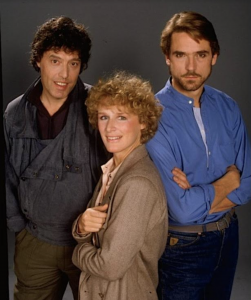
But the quality of the plays seemed wonderful; ditto the culture (mostly pre-AIDS) itself. Life was hard, of course (my finances were mostly a shambles until ’87) and the wrong people were in power and writers were stuck with typewriters and white-out, but compared to today it almost seems as if I was living a kind of half-charmed life. I could live and work and run around (my batting average was around .350, give or take**) and write without fear of wokester death squads, for one thing.
I wouldn’t say that my future seemed especially rosey or brilliant back then, but it certainly lay ahead. You don’t know what you’ve got ’til it’s gone.
The Reagan-era play that lifted me up and melted me down like none before or since was Tom Stoppard‘s The Real Thing (’84). Sappy as this sounds, it made me swoon. Okay, not “swoon” but it struck some kind of deep, profound chord. Partly because I saw it at a time when I believed that the right relationship with the right woman could really make a difference. That was then and this is now, but I was in the tank for this stuff in ’84. The play used the Monkees’ “I’m A Believer” as mood music, and I pretty much was one at the time.
I’m speaking of the original B’way production, of course, directed by Mike Nichols and costarring Jeremy Irons and Glenn Close. My admiration for Irons’ performance as Henry, a witty London playwright who resembled Stoppard in various ways, was boundless. Close, whom I was just getting to know back then, was truly magnificent as Annie. N.Y. Times critic Frank Rich called it “not only Mr. Stoppard’s most moving play, but also the most bracing play that anyone has written about love and marriage in years.”
(I went to see the 2000 B’way revival and was bitterly disappointed by Stephen Dillane‘s uncharismatic lead performance, which wasn’t even close to what Irons had brought.)
I was also floored that same year by James Lapine and Stephen Sondheim‘s Sunday in the Park With George, which opened at the Booth theatre on 5.2.84. It was one of the few B’way musicals that really reached inside, and it still makes me choke up when I watch it on YouTube.
I’m just going to list some of the plays that really hit the sweet spot between ’76 and ’85…I’m bypassing a few but here we go regardless:
Peter Shaffer‘s Equus, which I saw in London in the early summer of ’76. The great Colin Blakely was magnificent in the lead role of psychiatrist Martin Dysart (and better, I have to say, than Richard Burton was in the Sidney Lumet film version). I saw Anthony Perkins play the role in a B’way production of Equus in ’77, and I’m sorry to say that he underwhelmed.
A Broadway production of David Mamet‘s American Buffalo in early ’77. Directed by Ulu Grosbard with Robert Duvall, Kenneth McMillan and John Savage costarring. Four years later I saw it again (twice) at the Circle in the Square with Al Pacino as Teach. Pacino wasn’t a robot — he played certain lines and scenes a bit differently at times…experimentally, if you will. I was in heaven.

A little more than five years ago I posted a story about a minor Manhattan betrayal between two fellows (i.e., myself and a cartoonist-illustrator friend). It happened sometime in early ’80, give or take. The story alludes to a universally accepted code of behavior among guys worldwide, and a certain kind of deviance that is not accepted.
What follows isn’t so much a repost of the article (“Harold Pinter’s Betrayal“) as a reaction from an old friend to the piece, and a back-and-forth that resulted.
Posted on 6.12.16: Never rat another guy out when it comes to women. To put it more formally, one of the most paramount ethical codes between adult males is that you can never spill the beans on a friend or acquaintance if his girlfriend or wife asks you to reveal the truth about whatever (i.e., usually his deep-down feelings or some past behavior that has come under question).
Determining the factual or emotional truth of things is something that only a couple can sort out for themselves. It’s not yours to get involved. If a guy is lying to his girlfriend or wife about some indiscretion or affair or saying anything out of earshot that might get him in trouble, it’s none of your damn business and you’re obliged to say nothing. Omerta.
The truth will out sooner or later, but even if it doesn’t guys are absolutely honor-bound to protect each other. I’ve never run into a single fellow in my life who would even think of questioning this.
Except for one. He was a cartoonist-illustrator, and his betrayal happened in early ’80 or thereabouts. I’ll call him Saul. We’d met each other in ’79 by way of a fetching lady writer we both felt for and admired (I was the new boyfriend and he was an ex), and then we got to be actual friends.
At some point in the middle of ’80 (i.e., after I’d been dumped by the writer) I began a mild flirtation with an iconoclastic female cartoonist whom Saul also knew. Let’s call her Caroline. She was a respected, highly gifted artist and pretty besides.
By coincidence she and I realized one day over the phone that we had booked seats on the exact same flight to Los Angeles. A day or two later I mentioned to Saul that I’d love to indulge in a mile-high club thing with Caroline. It was just a fantasy, a wisp of a notion that came to mind and that I gave voice to. The anecdotal equivalent of a paper airplane.
I’ve noted several times that David Jones and Harold Pinter‘s Betrayal (’83) has been absent from streaming, Bluray and even DVD for decades. Herewith an English language capture, no subtitles — 91 minutes, posted on 2.11.20.
Ben Kingsley at 54:06: “I’ve always liked Jerry. To be honest I’ve always liked him rather more than I liked you. Maybe I should’ve had an affair with him myself.”
Posted 2 and 1/2 years ago: Asked by Time Out‘s Phil de Semlyen if he ever lost any roles due to being openly gay, Ian McKellen recounts the following: “One. Harold Pinter wanted me to be in a film of his, [1983’s Betrayal] and he took me to meet the producer, Sam Spiegel.
“We sat in Spiegel’s office and I happened to say that I was going to New York. He said, ‘Will you be taking the family?’ And I said, ‘I don’t have a family…I’m gay.’ I think it was the first time I came out to anyone. Well, I was out of that office in two minutes. It took Pinter 25 years to apologize for not sticking up for me.”
The part that McKellen would have played, of course, was Ben Kingsley‘s — i.e., Robert, the publisher-cuckold. Kingsley was excellent — it’s my all-time second favorite of his, right after Don Logan — but McKellen would have absolutely killed. If I’d been in McKellen’s shoes that day in Spiegel’s office, I would have said “I don’t have a family” and left it at that. Then he would have delivered a great Pinter performance that would last and last forever. A shame.
McKellen came out in 1988.



Roughly two months ago a very early draft of Eric Roth‘s screenplay for Killers of the Flower Moon (dated 2.20.17,...
More »
Frances McDormand‘s Fern was strong but mule-stubborn and at the end of the day self-destructive, and this stunted psychology led...
More »
Can’t decide which performance is better, although I’ve always leaned toward Tina Vitale, her cynical New Jersey moll behind the...
More »

Two days ago (1.19) a Facebook tribute congratulated Tippi Hedren for having reached her 94th year (blow out the candles!)...
More »
A friend suggested a list of the Ten Best American Crime Flicks of the ‘70s. By which he meant films...
More »
I’ve never been able to give myself over to Sam Peckinpah’s Major Dundee, a 1965 Civil War–era western, and I’ve...
More »